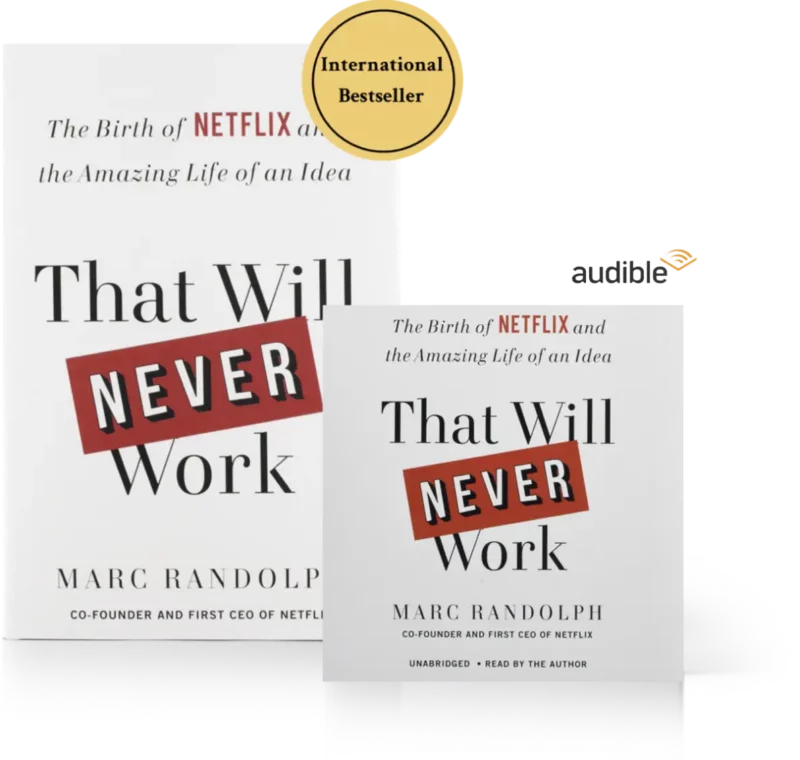The Power of Persistence.
Starting is critical. But sticking with it? Even more so.

I’ve often said that an entrepreneur’s most important trait is a propensity toward action. They simply start. And if you don’t have the drive and the courage to get that idea out of your head and into the real world – you’ll never get anywhere.
But once you’ve started, persistence is equally important. If you are trying to do something that hasn’t been done before, it’s almost a truism that the first things you try are not going to work. In fact, the first twenty things you try are not going to work. So, if you don’t have the discipline to persist through those initial setbacks, you’re going to miss the clues that will refine your intuition, guide your testing, and if you’re lucky, eventually lead you to the thing that will work.
No, It’s not easy, and it’s usually not quick either. When we launched Netflix, it took us more than year and a half, and hundreds of failed experiments, before we came up with the subscription business model that worked.
With Looker Data, it took us nearly two years to figure out what type of product Looker wanted to be and iterate our way to a repeatable scalable model. This has been the case for all six of my startups. And nearly every successful company I can think of had a similar trajectory.
It’s not just startups; persistence has been recognized as being an important attribute for success in almost any field. In Angela Duckworth’s book, Grit, she makes the case that for almost anyone striving to succeed—be it parents, students, educators, athletes, or business people— the secret to outstanding achievement is not talent but a special blend of passion and persistence.
The famous 1972 Stanford Marshmallow experiments led to a similar conclusion. In that study, preschool-age children were offered the choice between a small but immediate reward, or two larger rewards if they were willing to wait for them. In follow-up studies, the researchers found that children who were able to successfully delay gratification and wait longer for the preferred rewards not only did better in grade school, but tended to have better life outcomes, as measured by SAT scores, educational attainment, body mass index (BMI), and other life measures.
For an entrepreneur though, it’s more than a nice-to-have. Alone amongst the other entrepreneurial skills (triage, focus, discipline, confidence, vision, leadership, etc.), persistence is probably the only one that is indispensable. It’s binary. If you’re missing one of the others you can compensate. But without the persistence to keep going through your failed experiments, you’ll never get a chance for anything else.
One of the most frequent questions I get asked is “how do I know when to give up?” But I’ve come to believe that this is an imaginary question. True entrepreneurs almost never ask that. We are just not wired that way. There is always one more thing to try. One more possibility that just might work. Giving up is usually something that is forced on us externally – often by nothing more than running out of money.
Unfortunately, tales of the “how I built this” variety are full of survivor bias. We’re hearing from people after they’ve turned that corner. There is always the savvy pitch that saved the day, or the lucky break. We rarely hear from entrepreneurs who are still in the depths of it, still fighting, and haven’t yet gotten that glimpse of daylight. What keeps them going?
That’s why I’m so excited to share this week’s episode of That Will Never Work, because it’s our chance to hear from someone who is doing everything right, but is still struggling, still trying different ideas, and still searching for something – anything – that might work.
My guest, Bill, is not a quitter. He’s a youth hockey coach so he knows first-hand what it’s like to have been knocked down a few times. Although he’s having trouble finding traction with his young company, he’s not ready to give up, and still has more he wants to try. But he’s struggling. And after listening, I think you’ll agree that this practice of trial and error – that persistence – is as essential and as fascinating as any topic we all face.
Persistence isn’t easy. It means picking yourself up, dusting yourself off, and screwing up the courage to head back into battle. But it’s funny; as I reflect on all my start-up experiences, what I remember most vividly are not the big successes. I remember the hard times when things weren’t working. Because what makes persistence so rewarding is that wonderful feeling when you finally – on your hundredth attempt – finally do figure out that way to make it work.
-M
RECOMMENDED FOR YOU
Has Netflix Jumped the Shark?
Podcast Episode 72
Is it a Culture Problem or a Hiring Problem?
October 25, 2022 • 38 min
